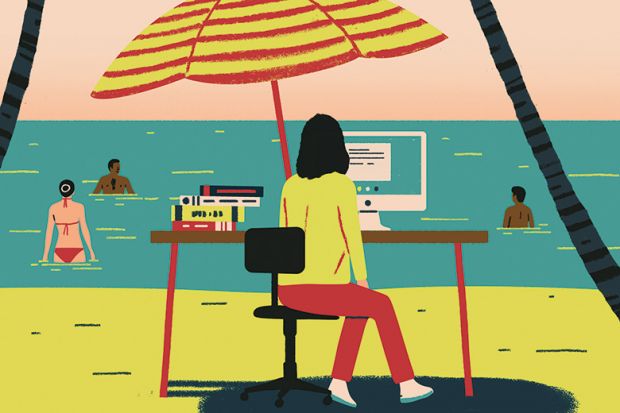“Tough life, huh?” We’ve all responded with some such phrase many times. That conference in Hawaii; those archives in Seville; that lecture in Paris: our friends tell us about these academic necessities of theirs, or we tell them about ours. The reaction is predictable: an eye-roll, then air quotes around the words “working hard, aren’t you?”
I think that a lot of us feel torn, unsure how to respond. Should it be: “No, no, honestly, it’s a serious conference!” or: “I’ll bring you back some tequila – if there’s any left!”? I know a scholar who studies Sicilian beachfront architecture. She’s as dedicated and serious-minded as they come; given the lifetime of scepticism that she’s facing, she needs to be. Academic work sometimes takes us to exotic locations and we get flak for it.
When we feel compelled to protest this teasing, it’s often to non-academics. It’s hard to convince people in other walks of life that some of our work really does depend on a particular exotic location and that our conferences, wherever they are held, lack much of the swag and glamour of their corporate analogues. We insist that we’ll be stuck inside the Hilton all day, running from conference session to conference session, never venturing beyond the deli on the corner. Or we describe how we’ll be first into the archives at 8:30am and last out at 6pm, and how we will spend every evening industriously marking essays and reviewing proofs. The world is full of pundits insisting that nobody employed by a university actually does any work. We don’t want to play up to those stereotypes – except that sometimes we’re too tired of explaining and just let our friends have their joke.
But to our academic colleagues, we might beef up the pretence, claiming that the conference sessions will all be empty and that every night we’ll be meeting far-flung colleagues at hidden bistros with their own vineyards. Why? Maybe we have to prove that our field or topic offers something that theirs doesn’t. Or perhaps because we know that most perks of academic life, although real, can be elusive or double-edged. The chance to travel, ideally on research funding and with friends, is one of the clearest and best benefits that we have. During my year of research leave in Florence, my two main conferences, which relocate annually, took place in Puerto Rico and Manhattan. At the former, I had breakfast with a colleague in a sun-drenched hammock and joked more than once that my professional life had just peaked.
The truth lies somewhere in the middle. Most of us work even longer hours on research trips than we do at home, desperate to wring every last advantage from them. But even if we spend 40 consecutive hours in the conference hotel, compare manuscripts until the magnifying glass trembles in our hand and devote solitary evenings to the committee work and emails that we can’t set aside, we’ll still take a Saturday afternoon to visit local churches. We’ll still scout out the rarest cheeses and chocolates to bring home. We’ll still miss one conference session to catch a museum or a show. When my UK colleagues decamped to Chicago last spring for our annual conference, they all bought Hamilton tickets, long before the London opening.
Perhaps I feel this dichotomy especially because I work on Italy and regularly spend long stretches of time there. People expect me to return with excellent shoes, a Latin lover and a perfect touch with pasta – or at least an expansive Mediterranean outlook à la Under the Tuscan Sun or Enchanted April. But during my first full year in Italy, I was working on a postgraduate certificate in tiny, sleepy Perugia. I spent hours reviewing my lessons and taking long walks; there was little else to do.
This was before the Meredith Kercher-Amanda Knox murder mystery made Perugia infamous. The internet had not yet reached my school, much less my shared flat, so on weekends I went out to the suburban house of an acquaintance, who let me check email on his desktop. Waiting for the bus home, in a dismal, deserted industrial outpost of an isolated city on a dead Sunday afternoon, was an utterly bleak and lonely prospect – no sunny enchantment in sight. Even now, as a fully fledged academic with research to do, my frustration with Italy’s mercurial rules, capricious transport and general unpredictability keeps pace with my growing love for its archives, the neighbourhoods that I have come to know and my expanding pool of local friends and colleagues. I’m happy working in Italy – and I do decently on the shoe front, at least – but I have never come close to romanticising it. If nothing else, I know too many brilliant, underemployed Italian academics.
But academic travel remains a huge sweetener, if we’re honest. Those of us who do archival research know the sensation that some part of our truest selves remains locked away during the teaching year and surfaces only when we get back to our documents. More broadly, I remember the wise potential Doktormutter who advised me to choose research subjects based in places that I’d enjoy returning to often. For all of us, being someplace picturesque, exotic, or at least dramatically different, makes up for being away from home. Even a brief overnight seminar may provide compensation for all the terrible conferences that we’ve already endured. And a beautiful landscape often wakes us up to why we chose an academic career in the first place. Being away is undeniably hard work, but for once the rewards are immediate.
Emily Michelson is senior lecturer in history at the University of St Andrews. She is available to give keynotes in Paris.
POSTSCRIPT:
Print headline: Club tropicana
Register to continue
Why register?
- Registration is free and only takes a moment
- Once registered, you can read 3 articles a month
- Sign up for our newsletter
Subscribe
Or subscribe for unlimited access to:
- Unlimited access to news, views, insights & reviews
- Digital editions
- Digital access to THE’s university and college rankings analysis
Already registered or a current subscriber?






